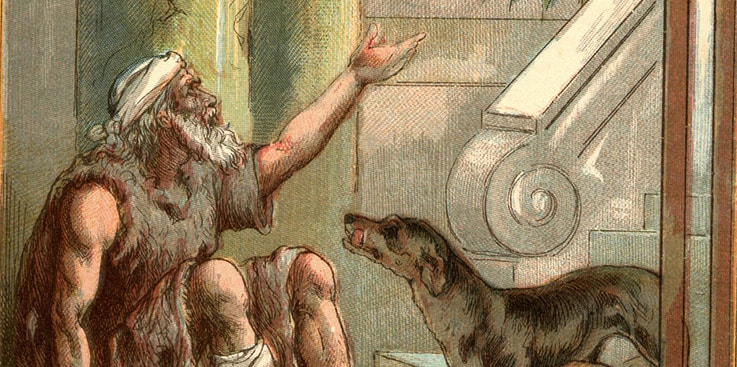 Sermon Sunday November 7, 2021 The Parable of the Rich Man and Lazarus. Luke 16: 19 - 31 In the name of the Father, and of the Son and of the Holy Spirit Today’s date is the 7th November, the 25th of October in the Julian calendar. It is the date of the October Revolution of 1917. Revolutions seem to stand up for the Lazaruses that we’ve just heard about, and against the rich men of this world. However all revolutions inevitably create a hell on earth, where the roles are reversed. Some of the Lazaruses, not that many, become the rich men. And the rich men become beggars, like Lazarus in today’s parable. Paradoxically, we hear from the Holy Fathers that hell, whether here on Earth or in the other dimension, is an expression of God’s love. Elder Ambrose of Optina also says that God does not create your cross. It grows on the soil of your heart. I think the same can be said about hell. We create it. Like the rich man in today’s parable who created a hell on Earth for Lazarus and a hell for himself in the afterlife. One might ask why hell is an expression of God’s love? While we are the ones who create it, God can turn things around and use it for our salvation. Pain transforms us. The rich man in today’s parable begins to think of other people for the first time in his life when he is in hell. That’s a step forward – progress! Wonderful! He thinks of himself first and asks Abraham to relieve his agony, but if that’s not possible, then at least he’s trying to do something for his brothers. Fantastic! I’ve been saying recently that we’ve had it too good for too long. We have been the rich men. Somewhere else millions, tens of millions, maybe hundreds of millions of Lazaruses out of our sight, have toiled like slaves and suffered to enable us to have the affluent lifestyle that we’ve had for decades. Some Lazaruses were even close to us, physically. But we didn’t notice them, like the rich man didn’t notice the Lazarus who was outside of his door. These Lazaruses close to us may not have needed material help, but they needed love. They needed our support, they needed a smile, a warm word, a hug, and we didn’t see that. We were engrossed in our good life, in our comforts. We didn’t want to be disturbed. As you know, I was born in Mao’s China. My grandparents took my parents there as little kids in 1920 – 21, because they didn’t agree with the revolution. My mum was a baby. In the city of Harbin, we had a spiritual elder whose name was Fr Ignati. He was an amazingly gifted man, a spiritually gifted man. He was blind but he would call people by their names as they came up to him. Even those that he’d never met before. One of our parishioners - whom I won’t mention by name in case it slightly embarrasses her although I don’t see anything embarrassing here in retrospect - she came to him as a teenager and would attend the monastery with her family where he lived. And he, the blind man, said to her, “Dear, you should be ashamed of yourself, fancy painting your toenails!”. Now she was wearing shoes, and he’s blind. How on earth did he know that she painted her toenails?! Fr Ignati died in 1958. In the mid – to late 1950s and early 60s most of the people began to leave Manchuria. Before Fr Ignati died, some people that I have known in Sydney came up to him for a blessing to go to Australia. He said, “By all means, God bless you. Go to Australia, but communism will come to Australia too.” So that’s a prophecy of sorts. There are other secular prophets. For instance I mentioned last year to you the book that I bought soon after it was published in May 2020 by a very prominent man in the DAVOS Economic Forum, Klaus Schwab. His book is called Covid 19 and the Great Reset. What is the Great Reset? This year he has been saying sort of a catch phrase By 2030 you won’t own anything and you’ll be happy. That’s another prophesy. Now a number of modern spiritual elders have all said that prophesies are given in order that they are not fulfilled, at least spiritual prophesies. The secret is repentance. Let’s learn from the Ninevites who took Jonah’s words very seriously. The prophet Jonah, in the belly of the whale. Read his book, the story is fascinating. Christ used the image of Jonah as the symbol of His resurrection on the third day. The Ninevites changed their life and survived. They acknowledged God and his values above bread and circuses. That’s a Roman expression, as you know, about the good life and entertainment that people value so much and have always valued throughout all the ages. And bread and circuses are still important in the world. All holy Lazaruses, millions of you, pray for us. Enable us to understand your spirit, so that we know where we’re going spiritually. Archpriest Nicholas Karipoff Bible StudyEvery second Sunday night, from 7pm, led by Father Nicholas Karipoff. To join the email list, contact Costa: [email protected] You can catch up with previous sessions on the Pokrov youtube channel. Watch the talk from Sunday Nov 7: https://youtu.be/iuflv37mPWM Trivia Bible Quiz Part 1 – how well do you know Genesis?! 1. In the Creation story what did God make on the 4th day? 1.Birds and fishes 2.Man 3.Light and darkness 4.Animals 2.Eve was tempted and ate what kind of fruit from the tree in the middle of the garden? 1.Apple 2.Orange 3.Banana 4.None of the above 3.Cain and Abel brought sacrifices to the Lord. Whose sacrifice was accepted? 1. Cain 2. Abel 4.How old was Noah when the flood came on the earth? 1.100 years 2.200 years 3.400 years 4.600 years 5. When the flood ceased – on which mountain did the Ark come to rest? 1. Sinai 2. Ararat 3. Tabor 4. Athos 6. How many days was it before Noah opened the window of the Ark to see if the waters had decreased of the earth? 1. 40 2. 150 3. 10 4. 7 7. What did Noah do first when he came out of the Ark? 1. lit a fire 2. saw a rainbow 3. shouted for joy 4. built an altar 8. When God called Abram to leave Haran which direction did he travel? 1. North 2. South 3. East 4. West 9. What is the relationship of Lot to Abram? 1. nephew 2. cousin 3. brother 4. father 10. What is the name of Sarai (Abram’s wife) maidservant? 1. Naomi 2. Rebekah 3. Ruth 4. Hagar (With thanks to Elaine) Answers: 1. 3 - Light and darkness Genesis 1:14-19 2. 4 – none of the above Genesis 3:1-7 3. 2 - Abel Genesis 4:3-8 4. 4 – 600 years Genesis 7:6 5. 2 -Ararat Genesis 8:4 6. 1 – 40 Genesis 8:6 7. 4 – built an altar Genesis 8:20 8. 2 – south Genesis 12:9 9. 1 – nephew Genesis 12:5 10. 4 – Hagar Genesis 16:1 Comments are closed.
|
Location |
|
